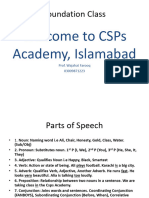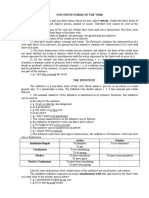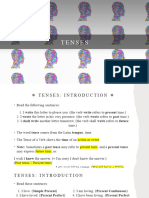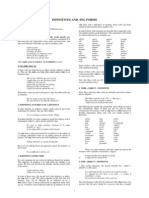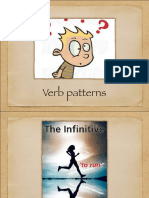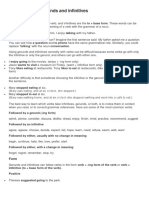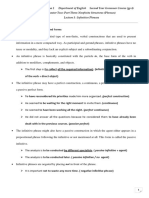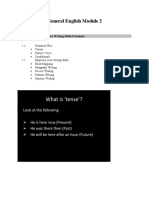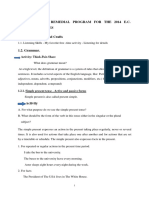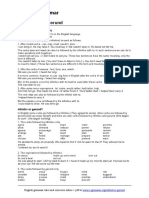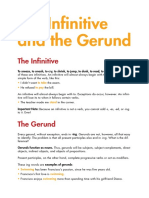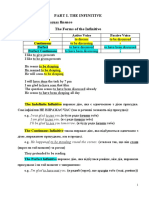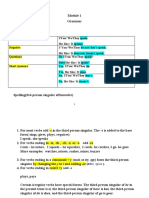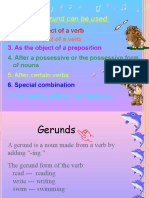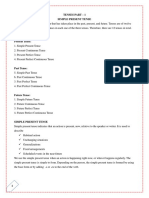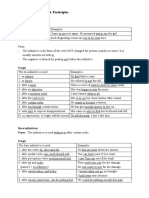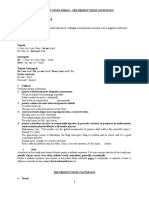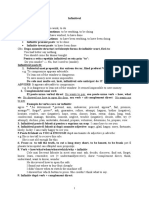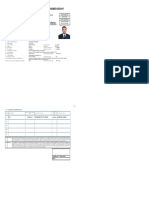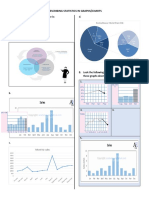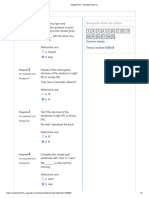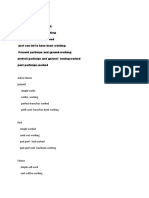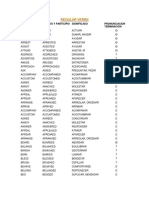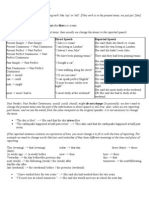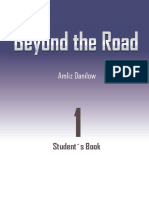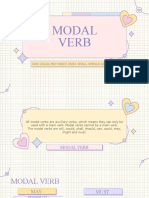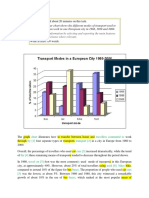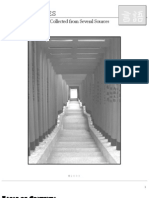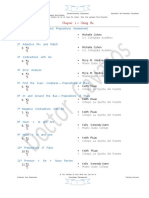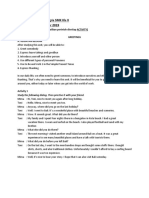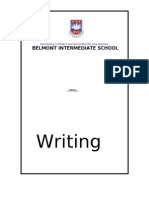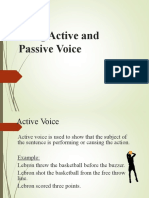Tenses
Tenses
Uploaded by
DHQ Hospital ChiniotCopyright:
Available Formats
Tenses
Tenses
Uploaded by
DHQ Hospital ChiniotCopyright
Available Formats
Share this document
Did you find this document useful?
Is this content inappropriate?
Copyright:
Available Formats
Tenses
Tenses
Uploaded by
DHQ Hospital ChiniotCopyright:
Available Formats
1
Tenses Notes
The Present Continuous
Uses
A) For an action happing now;
It is raining
B) For an action happing about this time but not necessarily at the moment of speaking;
He is reading a play by Shaw these days.
I am reading new novel.
I am teaching.
C) For decision about future made before the time of speaking.
I am appearing in PMS next month.
I am going to America next year.
D) For intention about Future; going to vs. will
VERBS NOT NORMALLY USED IN THIS CONTINUOUS TENSES
A) Verbs like; feel, hear, see, smell, notice, observe
B) Verbs expressing feeling and emotions e.g. Admire, adore, appreciate, care for, detest,
dislike, fear, hate, like, loathe, love, mind (care), respect, value, want, wish.
C) Verbs of mental activity, e.g. Agree, appreciate, assume, believe, expect, feel, certain, sure,
forget, know, mean, perceive, realize, recall, recognize, recollect, see, suppose and think.
D) Verbs of possessions; belong, owe, own and possess.
Present continuous tense is often used with adverbs such as; now, at this time.
Simple Present Tense
A) To present habitual action; He smoke. Dogs barks.
B) To describe time table, Routine, Schedule, professions, general truths.
Prof. Mohammad ASIF Shafe
2
C) It can be used for planning future actions or series of actions, particularly when they refer to
journey, e.g. We leave Faisalabad at 10 a.m next Tuesday and arrive in Lahore at 12. We spend
two hours in Lahore and leave for Islamabad at 2. We stay there for two days and then leave for
Murree……. Etc
The simple present tense is often used with adverbs or adverbs phrases such as; always, never,
occasionally, often, usually, every week, on Monday, twice a year and seldom etc.
Present Perfect tense
Perfect means ‘before’ in grammar. Present perfect means ‘before present’.
The action takes place in the near past but it consequences, impact etc is in present.
It is chiefly used in conversations, letters, newspapers and television and radio reports.
Adverbs
Just, just now, recently, lately, already, since, for and yet.
Present Perfect Continuous
Action starts in the past and continuous into the present.
Past Simple Tense
A) It is used for action completed in the past at a definite time. It is therefore used;
1) For a past action when the time is given. I met him yesterday, Pasteur died in 1895.
2) When the action clearly took place at a definite time even though this time is not
mentioned. The train was ten minutes late. I thought this book in Lahore.
3) For an action which occupied a period of time or when extended over a period of time but
now that action is terminated e.g. he worked in that bank for four years. He lived in
Islamabad for a long time.
4) For action that occurred at a moment in a period of time now terminated. He saw Jinnah
once.
Adverbs used
Yesterday, last day, last month, ago, a few months ago, any day, date and year or time of the
past.
Prof. Mohammad ASIF Shafe
3
Past continuous tense
The past continuous tense is chiefly used for past actions which continued for some time but whose
exact limits are not know and are not important.
It is also used to describe an action which was in progress at sometime in the past.
It was reading a novel.
Used without a time expression it can indicate gradual development;
It was getting dark. The wind was rising.
Past simple and past Continuous
Past perfect Tense and its combination with past simple.
Future simple tense
To express the speaker’s opinions, assumptions, speculations about the future. These may be
introduced by verbs such as assume, be afraid, feel, sure, believe, daresay, and doubt, perhaps, possibly,
probably and surely.
I am sure Ali will come back. I suppose they will sell the house. They will probably wail for us.
For future habitual action which we assume will take place.
Spring will come again. Birds will build nests. People will make plans.
Infinitive (To+ 1st form)
Uses
It may be used alone; we began to walk. Or as part of an infinitive phrase; we began to walk down the
road.
The infinitive may be the subject of a sentence;
To find fault is easy.
To err is human, to forgive divine.
To compromise appears advisable.
To learn out of the window is dangerous.
Prof. Mohammad ASIF Shafe
4
The infinitive may be the object or part of the object of a verb
I don’t mean to read.
Asif likes to play cards.
Two men failed to return from the expedition. I managed to put the fire out.
We are not prepared to wait any longer.
Verb + how/what/when/where/which/why + infinitive.
The verbs mostly frequently used in this way are asked, decide, discover, find out, forget, know, learn,
remember etc.
He discovered how to open the safe.
I found out where to buy fruit cheaply.
I don’t know when to switch the machine off.
I showed here which button to switch.
She couldn’t think what to say.
The bare infinitive after verbs and expressions
A) Can, do, may, shall, will
B) Need and dare
C) Feel, hear, see, watch
D) Bid, let, make
E) Would rather/sooner/rather/sooner than e.g. Asif would rather wait till tomorrow.
Rather than/ sooner than risk a bad crossing, he postponed his journey. I would rather die than
beg. I had rather play than work.
F) Had better
G) Help
Notice; if two infinitives are joined by and, the to of the second infinitive is normally dropped.
I intend to sit in the garden and write letters.
But and except take the bare infinitive when they follow;
Do+anything/ nothing/everything;
He does nothing but complain. My dog does everything but speak.
Can’t you do anything but ask silly questions? There is nothing to do but wait.
‘To’ problem
‘To’ can either be a part of an infinitive, or a preposition.
A) After be, have, ought, used, hate, hope, intend, would like/ would love, mean, plan, try, want, it
is part of an infinitive.
B) After look forward to, take to, accustomed to, be used to, it is preposition.
I am looking forward to seeing you tomorrow.
Prof. Mohammad ASIF Shafe
5
I am used to standing in queues.
Verbs followed by the gerund
The most important of these are
Admit*, keep, anticipate, loathe, appreciate, mean*, avoid, mind, consider*, miss, defer, pardon, delay,
postpone, enjoy, imagine, remember*, suggest*
He admitted taking money. Avoid over-eating.
Would you consider selling the property?
He detests writing letters. She dreads getting old. Do you enjoy teaching? He involve cutting away part
of the roof.
He kept complaining. He didn’t want to risk getting wet. If we buy plenty of food now it will save
shopping later in the week.
I can’t understand his/him leaving his friends.
I couldn’t help laughing. It’s no good / uses arguing.
Is there anything here worth buying?
Verbs which may take either infinitive or gerund;
Advise, agree, allow, being, can/can’t, bear, cease continue, hate, intend, like, love, mean, need, permit,
prefer, propose, recommend, regret, remember, require, start, stop, try, used to, want.
Verbs which should be followed by an infinitive;
Decide, plan, expect, fail, hope, intend, learn, promise, refuse, want, agree, consent, try, afford, agree,
expect, promise, propose, hesitate, neglect, attempt.
A verb may take an infinitive or a gerund according to its implication. If a verb indicates a purpose, an
infinitive should be used and if the verb indicates a cause, a gerund should be used.
He went to school to see the principal. (Not for seeing)
He was turning for coping answer. (Not to copy)
Remember
I must remember to post the letter/. I can remember posting the letter.
Forget
He forgets to pay the text.
I can never forget making mistakes in the paper.(remember/forget doing for memories in the past)
Regret
I regret to inform you that you have failed in the paper.
I regret spending all the money.
Try
I am trying to run this computer program.
Prof. Mohammad ASIF Shafe
6
I tried clicking on the box, but it did not work.
Stop
He stopped to talk.
Stop talking please.
Change of narration
If the direct speech is introduced by the verb in the present tense, then there is no change in the
tense of the verb in the direct speech.
If the direct speech is introduced by the verb in the past tense, then following changes in the
tense of verb in the indirect speech take place;
Direct Speech Indirect speech
Simple present Change into Simple present
First form 2nd form
Simple past Change into Past perfect
2nd form Had + 3rd form
Present continuous Change into Past continuous
Is, am, are Was, were
Past continuous Change into Past perfect continuous
Was, were Had been
Has, have Had
Will, shell Would
Would like/should like Would like/should like
Expression of time and place indirect speech
Adverbs and adverbial phrases of time change as follow
Direct Indirect
Today That days
Prof. Mohammad ASIF Shafe
7
Yesterday The day before, the previous day
The day before yesterday Two days before
Tomorrow The next day/ the following day
The day after tomorrow In two day’s time
Next week/year etc The following week year etc
Last week/year etc The previous week year etc
A year ago etc A year before/ the previous year
He said, ‘I saw her the day before yesterday’.
He said he had seen her two days before.
He promised, ‘I’ll do it tomorrow’.
He promised that he would do it the next day.
‘I’ m staring the day after tomorrow, mother, ’he said
He told his mother that he was staring in two days ‘time
She said, My father died a year ago’
She said that her father had died a year before/the previous year.
Indirect speech; pronoun and adjective
Pronoun and possessive adjective usually change from first or second to third person except when the
speaker is reporting his own words;
He said, ‘I’ve forgotten the combination of my safe’
He said that he had forgotten the combination of his safe.
Questions in indirect speech;
He said, ‘where is she going?
He asked where she was going.
He said, ’where does she live?
He asked where she lived.
Questions beginning will you/would you/could you?
Prof. Mohammad ASIF Shafe
8
These may be ordinary questions, but may also be requests, invitations, or, very occasionally,
commands.
He said, ‘will you be there tomorrow?
He asked if she would be there the next day
‘Will you stand still!’ he shouted.
He shouted at me to stand still. Or
He told me to stand still.
‘Would you like to live in New York?’ he asked.
He asked if I would like to live in New York.
Will/would you find these letters, please? He said.
He asked/told me to file the letters.
Important sentences
If I had the instruction manual I should/would know what to do’, said bill
Bill said that if he had the instruction manual he would know what to do.
Unreal past tenses after wish, would rather/sooner and it is time do not change;
‘We wish we didn’t have to take exams, ‘said the children.
The children said they wished they didn’t have to take exams.
‘It’s time we began planning our holidays,’ he said
He said that it was time that began planning their holidays.
Examples of indirect commands, request, advice
‘If I were you, I’d stop taking tranquilizers, ‘I said.
I advised him to stop taking tranquilizers.
‘Why don’t you take off your coat? He said
He advised me to take off my coat.
‘Would/Could you show me your passport, please?’ he said
Prof. Mohammad ASIF Shafe
9
He asked me to show him my passport. Or
He asked to see my passport.
Passive Voice
Active we keep the butter here.
Passive the butter is kept here.
Active they broke the window.
Passive the window was broken.
Active people have seen wolves in the streets.
Passive wolves have been seen in the streets.
The passive of continuous tenses requires the present continuous forms of to be, which are not
otherwise much used.
Active they are repairing the bridge.
Passive The Bridge is being repaired.
Active They were carrying the injured player off the field.
Passive The injured player was being carried off the field.
Other continuous tenses are exceedingly rarely used in the passive, so that sentences such as;
‘They have/had been repairing the road,’ and
‘They will/would be repairing the road’ are not normally put into the passive.
Auxiliary + infinitive combinations are made passive by using a passive infinitive;
Prof. Mohammad ASIF Shafe
10
Active You must/should shut these doors.
Passive These doors must/should be shut.
Active they should/ought to have told him.
Passive He should/ought to have boon told.
Other infinitive combinations
Active He wants someone to take photograph.
Passive He wants photograph to be taken.
Active He invited me to go.
Passive I was invited to go.
Active He urged the council to sell the house.
Passive The council was urged to sell the house.
Agree/be anxious/arrange/be determined. Determine/decide/ demand + infinitive +
objective are usually expressed in the passive by that……….should,
Active He decided to sell the house.
Passive He decided that the house should be sold.
Gerund combinations
Advise/insist/propose/recommend/suggest + gerund + object are usually expressed in
the passive by that……………….should
Active He recommended using bulletproof glass.
Passive He recommended that bullet-proof glass should be used.
Other Sentences
Prof. Mohammad ASIF Shafe
11
Active I remember them taking me to the zoo.
Passive I remember being taken to the zoo.
Active Tenses and their passive equivalents
Tense/Verb form Active voice Passive voice
Simple present Keeps Is kept
Present continuous Is keeping Is being kept
Simple past Kept Was kept
Past continuous Was kept Was being kept
Present perfect Has kept Has been kept
Past perfect Had kept Had been kept
Future Will keep Will be kept
Conditional Would keep Would be kept
Perfect conditional would have kept Would have been kept
Present infinitive To kept To be kept
Perfect infinitive To have kept To have been kept
Present participle/gerund Keeping Being kept
Prefect participle Having kept Having been kept
Prof. Mohammad ASIF Shafe
You might also like
- A Level English Language Revision NotesDocument34 pagesA Level English Language Revision NotesWilliam Want100% (9)
- ESL - English as a Second Language - Verbs: a QuickStudy Digital Reference GuideFrom EverandESL - English as a Second Language - Verbs: a QuickStudy Digital Reference GuideNo ratings yet
- Karnevskaya Elena On The Way To Success. Na Puti K Uspehu Readli - Net Bid255356 Original 4692dDocument94 pagesKarnevskaya Elena On The Way To Success. Na Puti K Uspehu Readli - Net Bid255356 Original 4692dIrinaNo ratings yet
- Simple Present Tense Subject+ Do/does Form of The Verb+object (1) To Express A Habitual Action AsDocument17 pagesSimple Present Tense Subject+ Do/does Form of The Verb+object (1) To Express A Habitual Action Asashika bistNo ratings yet
- English Lessons Political and International StudiesDocument34 pagesEnglish Lessons Political and International StudiesMeryem MkiraNo ratings yet
- Grammar TestDocument21 pagesGrammar TestAlina MaksimenkoNo ratings yet
- Foundation Class PDFDocument138 pagesFoundation Class PDFZeeshan Maqbool DanishNo ratings yet
- Таблица "Инфинитив и герундий"Document3 pagesТаблица "Инфинитив и герундий"Julia SmithNo ratings yet
- TensesDocument7 pagesTensesmanikarthikaNo ratings yet
- TensesDocument25 pagesTensesrajNo ratings yet
- English For Philosophy and Philology - Infinitive or - IngDocument14 pagesEnglish For Philosophy and Philology - Infinitive or - IngJoana Catany BlazquezNo ratings yet
- Eng-1093 (Grammer)Document55 pagesEng-1093 (Grammer)Shahzaib Butt.No ratings yet
- Gammer WordDocument10 pagesGammer WordPAhmed BabanNo ratings yet
- TENSESDocument19 pagesTENSESAryanNo ratings yet
- Indefinite Tenses (Examples)Document9 pagesIndefinite Tenses (Examples)statsenkoNo ratings yet
- Infinitive and GerundDocument8 pagesInfinitive and GerundAniol ComasNo ratings yet
- Tense: Es Add For The Third Person Singular (Works, Goes)Document16 pagesTense: Es Add For The Third Person Singular (Works, Goes)api-19776105No ratings yet
- Use of Gerund N Bare inDocument3 pagesUse of Gerund N Bare inkishwersultana829No ratings yet
- Theory of Non-Finite Types of VerbsDocument6 pagesTheory of Non-Finite Types of VerbslgkkfoekejekNo ratings yet
- Modulo 7 Grammar ReferencesDocument19 pagesModulo 7 Grammar ReferencesLEMMY RICHNo ratings yet
- Link GrammarBk2 U2 Answer-CheckingDocument11 pagesLink GrammarBk2 U2 Answer-Checkingmiki leeNo ratings yet
- Ing o Infinitivo PDFDocument3 pagesIng o Infinitivo PDFMarina VillaltaNo ratings yet
- Tenses - IntroductionDocument19 pagesTenses - IntroductionJose GremioNo ratings yet
- Tenses (Theory)Document29 pagesTenses (Theory)voropajana395No ratings yet
- A3n1v Wu1w9Document20 pagesA3n1v Wu1w9yolandafragaNo ratings yet
- Simple TensesDocument12 pagesSimple Tensessayedtamimhashimi2No ratings yet
- Infiniteves & - Ing Forms EFL MaterialDocument6 pagesInfiniteves & - Ing Forms EFL MaterialJaryn CapekNo ratings yet
- The InfinitiveDocument6 pagesThe InfinitivewahyuNo ratings yet
- Verb Patterns B2+Document25 pagesVerb Patterns B2+Lety BurgueñoNo ratings yet
- 3rd Year-Complete Grammar LessonDocument47 pages3rd Year-Complete Grammar LessonJojo AlipioNo ratings yet
- Functional Grammar and Correct Usage 12102015Document22 pagesFunctional Grammar and Correct Usage 12102015tadsrikanth_chainluNo ratings yet
- Modal Verbs in ENglasihDocument32 pagesModal Verbs in ENglasihНаталія ТроянNo ratings yet
- Gerung or InfinitDocument5 pagesGerung or InfinitnataNo ratings yet
- Parts of Speech and TensesDocument54 pagesParts of Speech and TensesJeevan KumawatNo ratings yet
- Gerunds and InfinitivesDocument30 pagesGerunds and InfinitivesAchmad Reza PahleviNo ratings yet
- Grammar Course Lecture Four Infintive PhrasesDocument5 pagesGrammar Course Lecture Four Infintive Phrasesfarawella09No ratings yet
- General English Module 2Document39 pagesGeneral English Module 2shambhavi sinhaNo ratings yet
- Bahan Ujian Akhir Semester 2 Kelas 10 Bahasa InggrisDocument12 pagesBahan Ujian Akhir Semester 2 Kelas 10 Bahasa InggrisIngrid ChristyNo ratings yet
- Remedial ProgrammDocument100 pagesRemedial Programmye9449299No ratings yet
- Infinitive and Gerund in EnglishDocument3 pagesInfinitive and Gerund in EnglishRaul Wal SchNo ratings yet
- Infinitive and The GerundDocument8 pagesInfinitive and The GerundSergoSanikidze100% (2)
- Verbals Дистанційне з.ф.Document40 pagesVerbals Дистанційне з.ф.Anjela CelinNo ratings yet
- Module One GrammarDocument36 pagesModule One GrammarMohammed IbdahNo ratings yet
- Е. Карневская, З. Курочкина, Е. Мисуно - On the Way to SuccessDocument96 pagesЕ. Карневская, З. Курочкина, Е. Мисуно - On the Way to SuccesssophyNo ratings yet
- GerundsDocument28 pagesGerundsRiidaNo ratings yet
- The Forms of The Infinitive-: Verb TensesDocument9 pagesThe Forms of The Infinitive-: Verb TensesО. ЦолмонбаярNo ratings yet
- GerundsDocument7 pagesGerundsAdriana IbarraNo ratings yet
- Module One Grammar.Document50 pagesModule One Grammar.Mohammed IbdahNo ratings yet
- Tenses Part - 1 Simple Present TenseDocument5 pagesTenses Part - 1 Simple Present Tensesiva kumar100% (1)
- Infinitives, Gerunds & Participles InfinitivesDocument7 pagesInfinitives, Gerunds & Participles InfinitivesFe Jandugan100% (1)
- Tenses: Shivani M. (PDP Dept.)Document21 pagesTenses: Shivani M. (PDP Dept.)Sandeep SinghNo ratings yet
- Lesson Plan 6 Unit-1-Trending (Pioneer Intermediate) Intensive Intermediate English I PDFDocument21 pagesLesson Plan 6 Unit-1-Trending (Pioneer Intermediate) Intensive Intermediate English I PDFJuan Francisco Hidalgo Sandoval0% (1)
- The Present Tense Simple - The Present Tense ContinuousDocument3 pagesThe Present Tense Simple - The Present Tense ContinuousNistor DumitruNo ratings yet
- Infinitivul Si GeruziulDocument4 pagesInfinitivul Si GeruziulM. ElenNo ratings yet
- Infinitives, Gerunds & Participles InfinitivesDocument7 pagesInfinitives, Gerunds & Participles InfinitivesIustin Şulea100% (1)
- Adverbs of PlaceDocument4 pagesAdverbs of PlacentandosageNo ratings yet
- Grammar 5 - OxfordDocument13 pagesGrammar 5 - OxfordNino KemertelidzeNo ratings yet
- The Present ContinuousDocument3 pagesThe Present ContinuousSimona AndreeaNo ratings yet
- SentenceDocument12 pagesSentenceSumera BokhariNo ratings yet
- BioDocument36 pagesBioDHQ Hospital ChiniotNo ratings yet
- Federal Public Service Commission: Sector F-5/1, Aga Khan Road, IslamabadDocument2 pagesFederal Public Service Commission: Sector F-5/1, Aga Khan Road, IslamabadDHQ Hospital ChiniotNo ratings yet
- CompleteAttendanceReport 09 12 2019Document4 pagesCompleteAttendanceReport 09 12 2019DHQ Hospital ChiniotNo ratings yet
- Arcs PDFDocument2 pagesArcs PDFDHQ Hospital ChiniotNo ratings yet
- Principles of ManagementHRMDocument4 pagesPrinciples of ManagementHRMDHQ Hospital ChiniotNo ratings yet
- Him SssssssDocument1 pageHim SssssssDHQ Hospital ChiniotNo ratings yet
- Gabriela Gonzalez Assignmet 1. Unit 7Document3 pagesGabriela Gonzalez Assignmet 1. Unit 7Gaby GonzálezNo ratings yet
- Describing Statistics in GraphsDocument4 pagesDescribing Statistics in GraphsNurul AuliaNo ratings yet
- Although Inspite of Despite Even ThoughDocument5 pagesAlthough Inspite of Despite Even ThoughMarta Norton CondeNo ratings yet
- Spoken BookDocument130 pagesSpoken BookSyed Mominul:56 ID:034100% (1)
- Assignment 1 Questionnaire U1Document4 pagesAssignment 1 Questionnaire U1Miriam RSNo ratings yet
- Active Tenses Present Simple Works Contin-Working Perfect Have/has Worked Perft Cont - Have/has Been WorkingDocument6 pagesActive Tenses Present Simple Works Contin-Working Perfect Have/has Worked Perft Cont - Have/has Been WorkingDgNo ratings yet
- Handout: Kasus: Nominativ Und Akkusativ (Nach Nancy Thuleen)Document3 pagesHandout: Kasus: Nominativ Und Akkusativ (Nach Nancy Thuleen)Payal KakalotarNo ratings yet
- Puro VerboDocument28 pagesPuro VerboGra Ciela ZLNo ratings yet
- Curio SlidesCarnivalDocument15 pagesCurio SlidesCarnivalsaynaNo ratings yet
- Reported Speech RulesDocument2 pagesReported Speech RulesVSNG EnglishNo ratings yet
- YLE Exam Changes 2018Document1 pageYLE Exam Changes 2018Bryan Castañeda100% (1)
- BASIC English Alphabet, Structure of Sentences & Parts of SpeechDocument44 pagesBASIC English Alphabet, Structure of Sentences & Parts of Speechurvashi kadareNo ratings yet
- Book One EditableDocument108 pagesBook One EditableDaniel RodriguezNo ratings yet
- Table of Irregular Verbs Verb Past Tense Present Participle Past ParticipleDocument3 pagesTable of Irregular Verbs Verb Past Tense Present Participle Past Participlealongita311No ratings yet
- Working Verb TensesDocument1 pageWorking Verb Tensesflory_si_danNo ratings yet
- English Modal VerbDocument6 pagesEnglish Modal VerbALIFAH ILYANA NATASYA BINTI ZAIRAL AZMI MoeNo ratings yet
- Cba of Adjectives Adorable Charming and Cute On CocaDocument5 pagesCba of Adjectives Adorable Charming and Cute On CocaJameel MemonNo ratings yet
- Too and Enough: This Chair Is Too SoftDocument2 pagesToo and Enough: This Chair Is Too SoftLinh ChuNo ratings yet
- Bach - Writing Task 1 - Bar Chart - European Transport ModesDocument3 pagesBach - Writing Task 1 - Bar Chart - European Transport ModesAn TịnhNo ratings yet
- My Japanese NotesDocument59 pagesMy Japanese NotesDae101100% (2)
- Swedish Grammar PortraitDocument11 pagesSwedish Grammar PortraitRoman LazelovNo ratings yet
- English 5 - T. Roxanne Q2WK3Document6 pagesEnglish 5 - T. Roxanne Q2WK3Roxanne Mae De Vera100% (1)
- 1º 3rd Edition CH 1 Using BEDocument2 pages1º 3rd Edition CH 1 Using BEPedro Cavazos GarzaNo ratings yet
- Khusus Teori A Dan B: Melalui Your Basic VocabularyDocument38 pagesKhusus Teori A Dan B: Melalui Your Basic VocabularyRais AnsariNo ratings yet
- 6 English - 1 Functions of NounsDocument9 pages6 English - 1 Functions of NounsRochelle Acala Del RosarioNo ratings yet
- Bahan Ajar Kelas 10Document12 pagesBahan Ajar Kelas 10aristyNo ratings yet
- Wuolah Free Apuntes Sintaxis IIDocument17 pagesWuolah Free Apuntes Sintaxis IIPaula Martínez CarbúNo ratings yet
- Writing: Belmont Intermediate SchoolDocument16 pagesWriting: Belmont Intermediate SchoolbelmontintNo ratings yet
- Using Active and Passive VoiceDocument11 pagesUsing Active and Passive Voiceمعلومة تاريخية100% (1)






